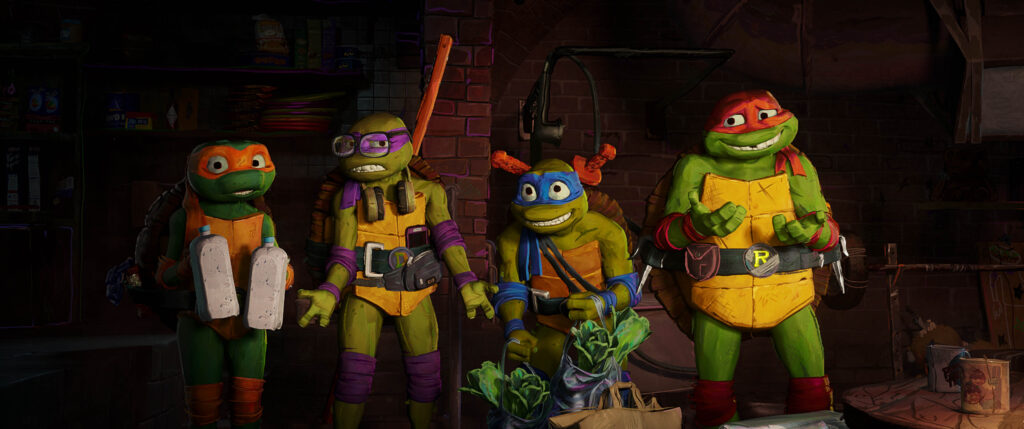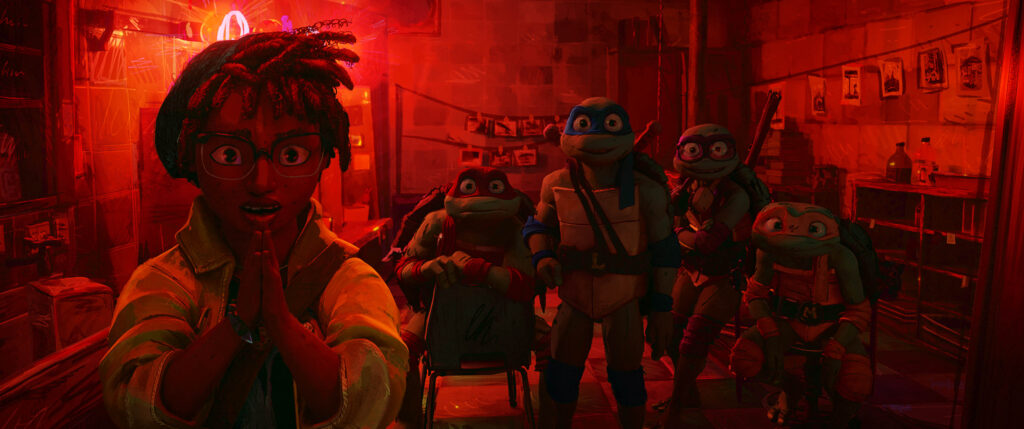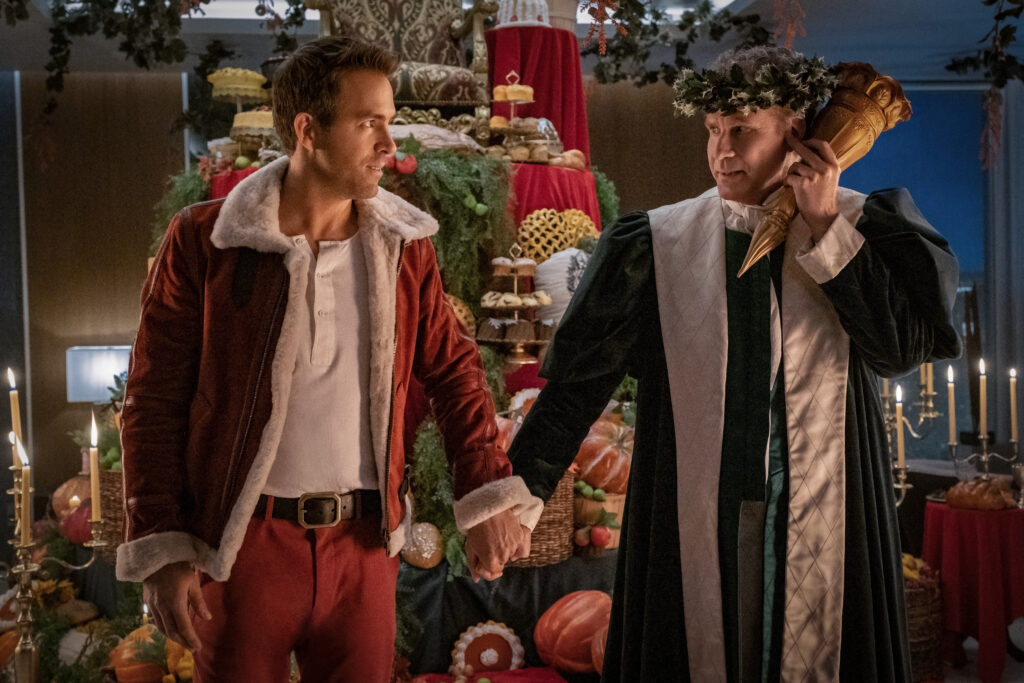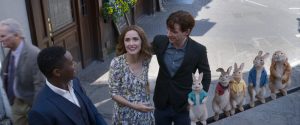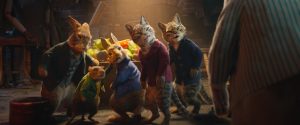May 27, 2024
by Carla Hay

Directed by Tony Goldwyn
Culture Representation: Taking place in various parts of the United States, the dramatic film “Ezra” features a predominantly white cast of characters (with some black people, Asians and Latin people) representing the working-class, middle-class and wealthy.
Culture Clash: A divorced stand-up comedian, who has a volatile temper, illegally takes his 11-year-old autistic son on a cross-country road trip when the comedian gets a guest appearance on “Jimmy Kimmel Live.”
Culture Audience: “Ezra” will appeal primarily to people are fans of the movie’s headliners and stories about father-son bonding, even if some of the story is problematic.

Even though the name of the movie is “Ezra,” this uneven but well-acted drama is really about Ezra’s loudmouth and volatile father Max Brandel. This sometimes-frustrating film comes dangerously close to glorifying bad parenting but is saved by some realistic and heartfelt moments. Still, viewers with enough life experience will never feel like this movie is completely relatable, since so much of the movie looks contrived, even if some of the story was inspired by real people.
“Ezra” is directed by Tony Goldwyn, an actor who’s had numerous roles in film and TV but is best known for the role of Fitzgerald Grant III (a fictional U.S. president) on the TV drama series “Scandal,” which was on the air from 2012 to 2018. Goldwyn has directed several episodes in TV series (such as “Scandal” and “Dexter”), and the previous movies he directed have been about romances, such as 1999’s “A Walk on the Moon,” 2001’s “Someone Like You” and 2006’s “The Last Kiss.” Tony Spiridakis wrote the screenplay for “Ezra,” whose title character is a boy living with autism. Spiridakis’ son Dimitri is also living with autism. “Ezra” had its world premiere at the 2023 Toronto International Film Festival.
The movie begins with a scene of comedian Max Brandel (played by Bobby Cannavale) doing a stand-up comedy performance somewhere in a New York City nightclub. In his perfomance, Max talks about having an underage autistic son and how this child wouldn’t speak for several years, and “when he finally started speaking, he wouldn’t shut up.” Max tells a few more jokes and gets a fairly good, but not overly impressive, response from the audience. People clap and do some cheering, but they aren’t giving Max a standing ovation.
Max has a few more upcoming gigs booked at this nightclub. The nightclub owner Robert “Bob” Segal (played by Geoffrey Owens) tells Max that a talent booker from “Jimmy Kimmel Live” is going to be in the audience at one of Max’s upcoming shows. Max’s manager Jayne (played by Whoopi Goldberg) is thrilled and tells Max not to do anything to mess up this big opportunity.
Max has a tarnished reputation and a damaged career, so getting a guest apperance on “Jimmy Kimmel Live” will be a big career boost for Max. He used to be a hotshot comedy writer in late-night television until he was fired for punching his former boss Conan O’Brien. Max became a stand-up comedian after not being able to get a job as a TV writer because of this scandal. Max (who lives in Hoboken, New Jersey) is also financially broke and had to move in with his divorced father Stan (played by Robert De Niro), who also has a “loose cannon” temper.
Max is divorced from Ezra’s mother Jenna (played by Rose Byrne), and they share custody of 11-year-old Ezra (played by William A. Fitzgerald), who is a bright and inquisitive child. (Fitzgerald is on the autism specturm in real life.) Max still hasn’t gotten over the divorce from Jenna and keeps hoping that he and Jenna will get back together. Jenna has already moved on to someone else. She’s currently dating an attorney named Bruce (played by Goldwyn), who’s somewhat smug, but Bruce tries to stay out of the squabbles that Jenna and Max have over how Ezra should be raised.
Max and Jenna have very different parenting styles. Max sees nothing wrong with not having a strict routine for Ezra and exposing Max to entertainment meant for older teens and adults. For example, Max lets Ezra binge watch “Breaking Bad,” a TV series about a drug dealer, with a lot of violence and cursing. Max also sees nothing wrong with bringing Ezra to nightclubs and letting Ezra stay up late to watch Max perform. Jenna wants Ezra to have a more structured upbringing where he’s expected to follow rules that most kids his age would have.
At the public school where Ezra is a student, Ezra gets into trouble for disrupting a class by quoting some threatening curse-filled dialogue that he heard on “Breaking Bad.” Max and Jenna are called to have an urgent meeting with the school’s Principal Lee (played by Daphne Rubin-Vega) to decide what to do about Ezra, who has gotten into fights before at this school. These fights are not seen in the movie, but Max insists in the meeting with Principal Lee that Ezra was being bullied and fought back in self-defense in these previous fight incidents.
Principal Lee suggests that Ezra might be better off in a school for kids with special needs. Max hates the idea because he thinks Ezra needs to learn what it’s like to be in the “real world,” and he thinks Max does not belong in a school for kids with disabilities. Jenna is concerned for Ezra’s safety in this public school, so she is much more open to the idea of putting Ezra in a school where he is much less-likely to be bullied for being “different.”
During this family turmoil, Max is at home with Jenna, when he overhears Bruce sarcastically joking that Bruce can get rid of Max by putting a murder-for-hire hit on Max. Ezra doesn’t understand that Bruce is just joking, so Ezra panics and runs out in the street, where he is hit by a car.
It leads to an investigation over whether or not Ezra is suicidal. Ezra doesn’t tell anyone right away that he ran out in the street because of what he heard Bruce say. Max insists that Ezra is not suicidal. Jenna isn’t so sure and wants to wait and hear the diagnosis of a child psychiatrist who has examined Ezra.
A meeting that Max and Jenna have with a child psychiatrist named Dr. Kaplan (played by Alex Plank) goes very badly when the doctor prescribes Risperdal, also known Risperdone, to Ezra. Risperdal is prescribed to people with schizophrenia, bipolar disorder and autism spectrum disorder. Max thinks this medication is too strong and inappropriate for Ezra. Max and Dr. Kaplan have a verbal argument, which turns into Max punching Dr. Kaplan.
Max gets arrested for this assault. Dr. Kaplan declines to press charges on the condition that Max has a restraining order against him. Under this restraining order, Max can’t see Ezra for three months. Bruce is Max’s attorney, which seems like a conflict of interest, but it can be presumed that Bruce only decided to take Max as a client because Jenna asked Bruce. Jenna probably asked Bruce to give Max a discount on Bruce’s usual legal fees.
Not surprisingly, Max hates being in this legal mess, but he doesn’t show much remorse for the fact that he created this mess. Max also thinks it’s unfair that he can’t see Ezra because Max doesn’t think he’s a danger to his child and can’t bear to go three months without seeing Ezra. When Max finds out that he’s been booked for a stand-up comedy appearance on the Los Angeles-based “Jimmy Kimmel Live,” Max decides to illegally take Ezra on a cross-country road trip to Los Angeles so that Ezra can be on the set of “Jimmy Kimmel Live” to watch Max perform.
During this road trip (which includes stops in Michigan and Nebraska), Ezra tells Max several times that Ezra wants to go home, but Max ignores those pleas. Max rudely and stubbornly treats a frantic Jenna as if she’s being an unreasonable shrew for worrying about Ezra in this kidnapping. And to be clear: It is literally a child abduction, since Max went to Jenna’s home at night, woke up a sleeping Ezra, and secretly took Ezra out of the home without permission. Max also dismisses Stan’s warning advice not to take Ezra on the road trip and to bring Ezra back to Jenna’s home.
If all of this sounds like awful and selfish parenting from Max, it is. And at times, it becomes very annoying when the movie tries to convince viewers that Max is a misunderstood parent who’s fighting back against the “system” that’s “robbing” Max of wanting to spend time with his child. The movie only succeeds if the intention is to show that flawed, self-absorbed and dysfunctional parents like Max exist and are very much in denial about the bad decisions that they make as parents.
Some of Max’s childhood is mentioned as a way to explain why he turned out the way that he is. When Max was a child, Stan used to have a successful career as a professional chef in top-rated restaurants in New York City. But time and time again, Stan would get fired because of something (usually violent) that he did when he lost his temper. Stan’s wife eventually left the family because she couldn’t take living with Stan anymore. Stan raised Max as a single parent, and they have not had contact with Max’s mother for decades.
For a while, when Max was still a boy, Stan and Max moved to a rural part of Nebraska because Stan couldn’t find work as a chef in the New York City area. But father and son eventually moved back to the New York/New Jersey area. Stan became an apartment building doorman, which is the job that he has when this story takes place. Stan seems to have mellowed with age, but he can still be feisty, and he gets into arguments with Max. Although they disagree on many things, Stan and Max are actually a lot more alike than they care to admit.
At first, Jenna doesn’t want to call the police about Max illegally taking Ezra because she thinks it would be traumatic for Ezra to see Max get arrested. But after four days of Max avoiding or deliberately cutting off her phone calls, Jenna takes Bruce’s advice and calls the police to report the kidnapping. Because most of the movie is about the road trip, a lot of screen time in “Ezra” is about Max revisiting friends from his past, because he needs safe places to stay to hide out from the law. Two of these friends are a former comedian named Nick (played by Rainn Wilson) and a former schoolmate named Grace (played by Vera Farmiga), who knows Max from when they went to the same high school.
“Ezra” has moments of messy melodrama that are kind of eye-rolling in how fake these moments look. But then, the movie also has quieter moments that are engaging and more authentic. The scenes where Max visits past friends stand out as among the strongest parts of the movie. Cannavale and Byrne also have realistic chemistry as parents who know each other very well. (Cannavale and Byrne are a couple and parents in real life.)
Ezra has the type of autism where he doesn’t like to be hugged. And so, there are some poignant scenes where Max and Jenna try to hug Ezra, and he recoils as if he’s in pain. He sometimes shouts at someone to not touch him, or he will coldly tell someone who wants to hug him, “You can go now.” These scenes show the heart-wrenching emotions parents must feel when they know showing affection to their child, such as giving a hug to their child, can make the child feel very uncomfortable or unsafe. Jenna can usually calm Ezra down by rubbing his ear while he rubs her ear.
Ezra is also afraid of using eating utensils that aren’t plastic. Max tries to get Ezra to change this way of thinking in a scene that’s a little hard to watch because of how Max loses his patience with Ezra. Max often fails to understand that he can’t force Ezra to have the same type of childhood learning process that Max had when Max was a kid.
Max doesn’t want Ezra to be coddled, but Max frequently loses sight of what’s in the best interest of Ezra. Nowhere is this more evident than in scenes where Max repeatedly describes Ezra as Max’s “mojo” good luck charm. A child should not be described as being a good luck object. A child’s worth should not defined by a parent forcing the child to have the responsibility of making a parent happy. Max uses this excuse as the reason why Ezra needs to go on this road trip with Max to “Jimmy Kimmel Live.”
Cannavale (who’s doing yet another role as a brash, fast-talking character) carries the movie with a certain amount of intensity but doesn’t go overboard into implausibility for his Max character, even though some of the situations are written and directed in an over-the-top way. (The movie’s mid-credits scene is ridiculous and out of place.) Max isn’t a bad person, but he can be very irritating, and his violent actions should not be excused.
Fitzgerald, De Niro and Byrne do fine jobs with their roles and are convincing as family members who are frequently at odds with each other. But this “Ezra” movie is really Max’s show, and everyone else is just living in it. How much viewers will enjoy this movie will depend how much they think what Max does is worth forgiving and how much they think he’ll learn from his terrible mistakes.
Bleecker Street will release “Ezra” in U.S. cinemas on May 31, 2024. A sneak preview of the movie was held in U.S. cinemas on May 20, 2024.

